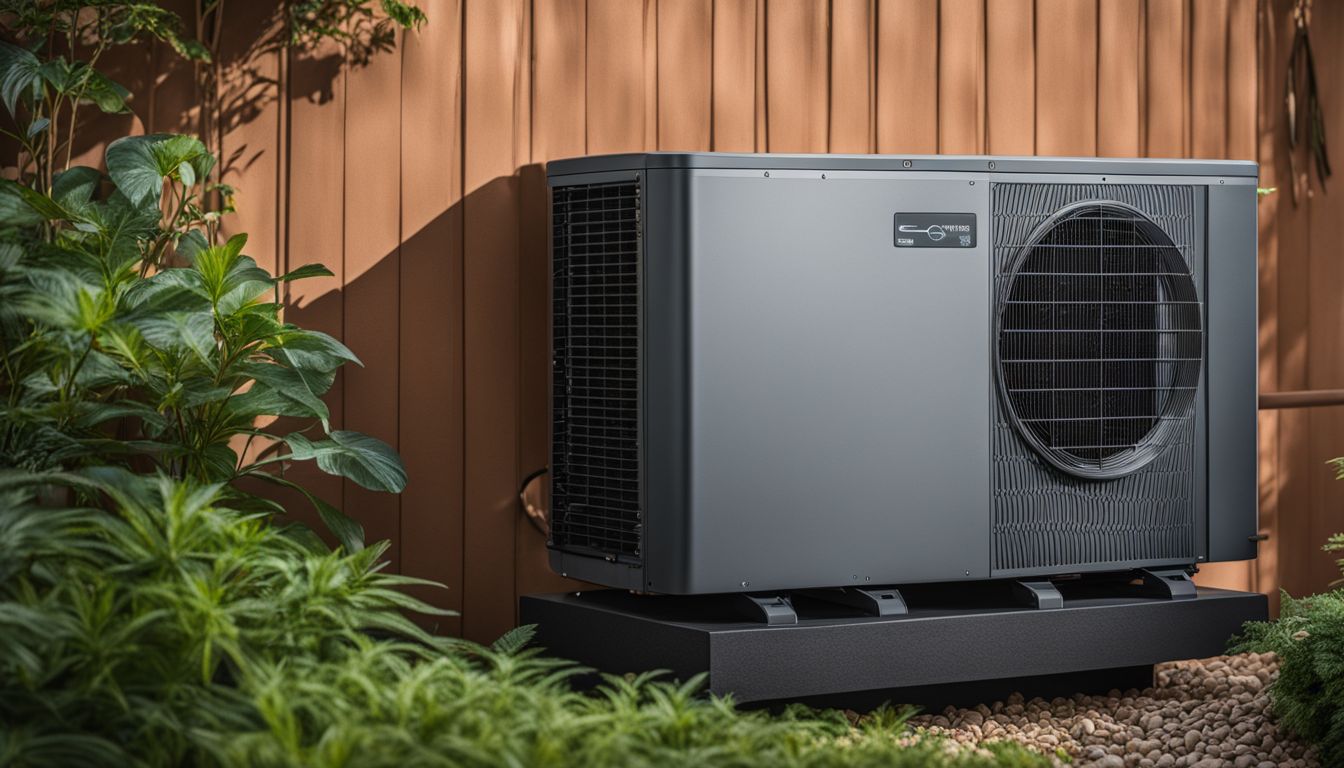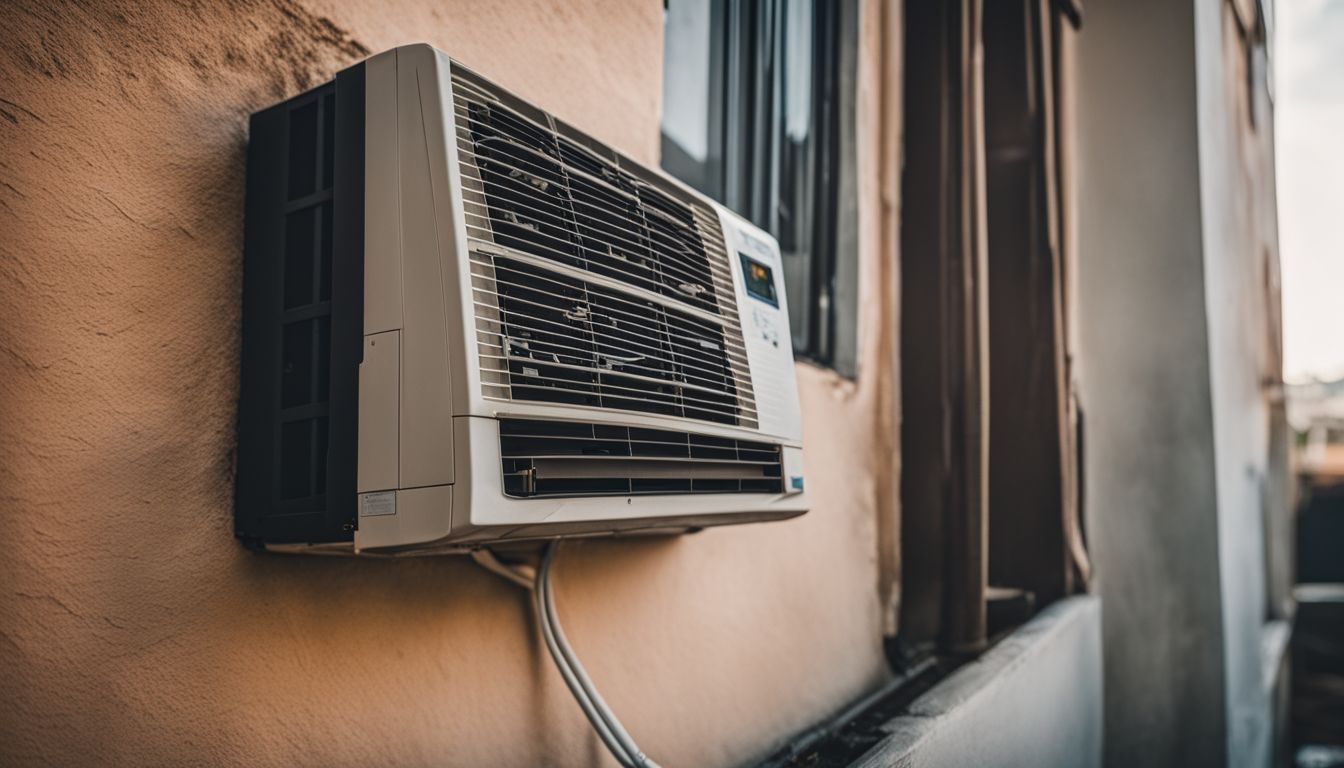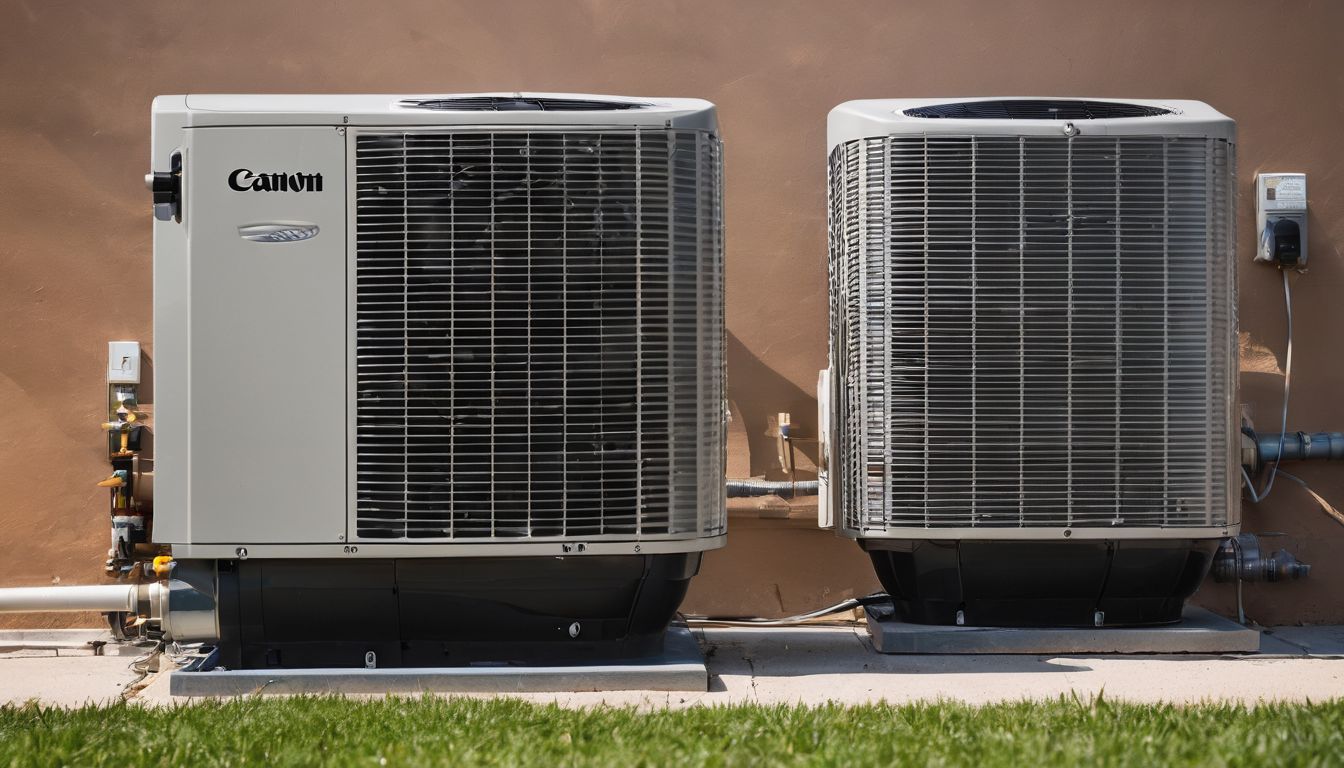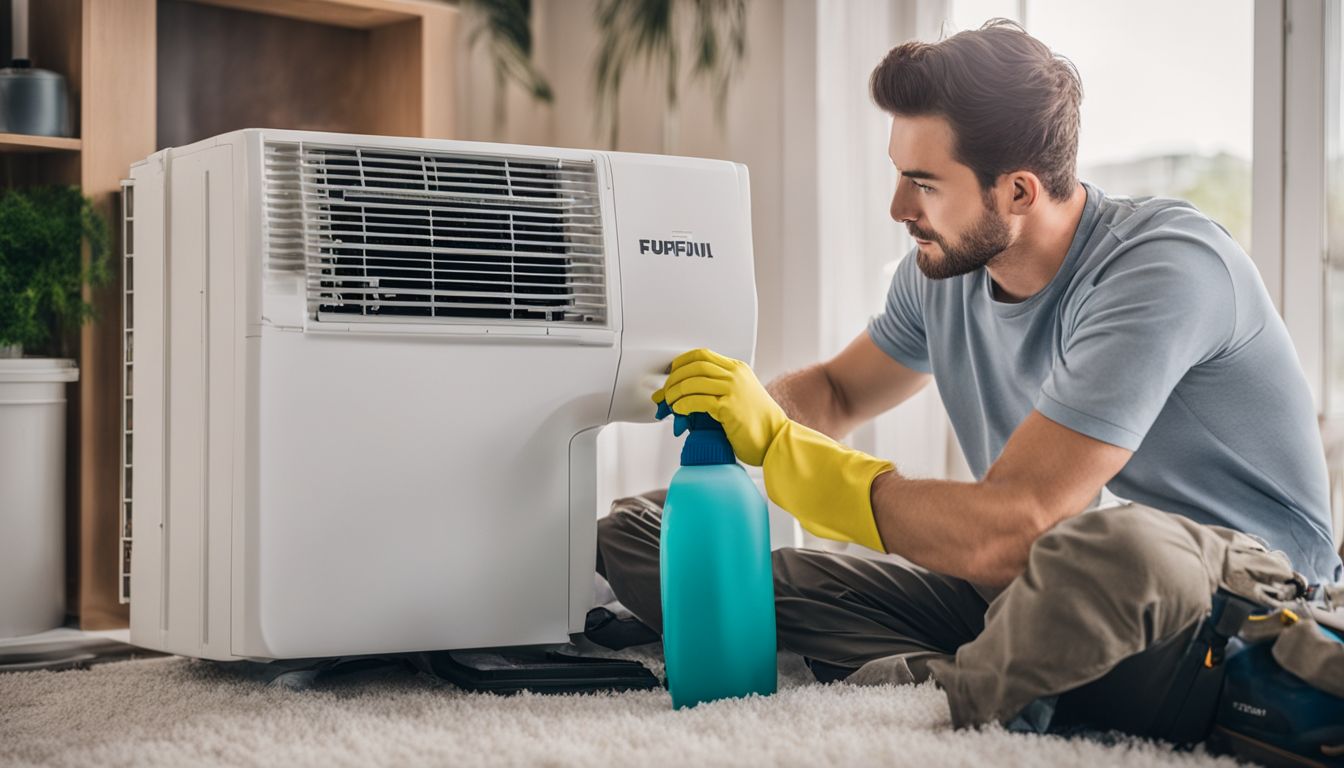Wondering just how long your air conditioner will keep the heat at bay? Statistics tell us that the average air conditioning unit has a refreshingly cool lifespan of 10-15 years. Our guide is packed with tips to ensure you squeeze every bit of comfort from your cooling companion.
Don’t sweat it; we’re here to help make sure you stay chilled for years to come!
Average Lifespan of Air Conditioning Units
Air conditioning units are not built to last forever, but a well-maintained system can give you comfort for many years. On average, the typical lifespan of an AC unit ranges from 10 to 15 years; however, central air conditioners might serve your home efficiently for about 12 to 17 years.
Factors like the frequency of use and maintenance play pivotal roles in determining how long your HVAC unit remains functional.
Central air conditioner systems often promise longer operational times compared with window units or portable variations due to their durability and design intended for continuous use.
Regular preventive maintenance is crucial—it ensures essential components such as compressors, coils, and air filters function optimally. Expect energy bills to remain manageable when these parts receive timely attention since efficiency drops sharply when they falter due to wear and tear.
Extend the serviceable life of your cooling system by scheduling annual check-ups with licensed professionals skilled in handling all types of HVAC equipment, including heat pumps and steam boilers.
Factors Influencing the Lifespan of Air Conditioners
Understanding the longevity of your air conditioning system involves more than just a glance at the calendar; it’s about grasping the various elements that interact and ultimately determine how long your unit will effectively cool your home.
These interplaying factors range from habitual usage patterns to diligent upkeep, each leaving an indelible mark on the operational life of your HVAC unit.
Rate of Use
Just like any mechanical system, your air conditioning unit’s lifespan gets shorter the more you use it. Think of it as a car; a heavy foot on the pedal means more trips to the mechanic.
It’s no different with your HVAC systems — constant use leads to faster wear and tear. During scorching summer months or if you live in a warmer climate, your unit works overtime to keep indoor air quality cool and comfortable.
This increased workload can cause major parts, such as the evaporator coil and condensing coil, to strain under pressure.
Regular usage doesn’t just affect internal components; it also impacts energy consumption. Units that are always running tend to consume more power, which might not be kind to your pocket due to higher electricity bills or frequent repairman visits for system breakdowns.
To strike a balance between comfort and efficiency, consider using programmable thermostats or smart thermostat technology. These help manage how often your air conditioner runs by adjusting settings based on when you’re home or away.
Taking these steps ensures optimal energy efficiency without putting undue stress on your HVAC units.
Level of Maintenance
Maintaining your air conditioning unit is a crucial step towards securing longer service life. Think of it as regular health check-ups for your mechanical systems; skipping them can lead to serious issues down the road.
Regular coil cleaning, appropriate thermostat settings, and promptly addressing repairs can drastically improve your AC’s lifespan. Experts suggest servicing your unit every 12 months to keep it running smoothly.
Neglecting these maintenance routines might save you some money in the short term but could cost you more later on. Dust build-up and neglected parts increase energy use, strain the system, and inevitably shorten its life expectancy.
Practical actions like replacing filters or scheduling professional tune-ups ensure that heating and cooling functions remain efficient year-round. Keep in mind that intelligent care extends beyond simple fixes; understanding the intricate relationship between usage patterns and maintenance schedules pays off by enhancing energy efficiency over time.
Exposure to Elements

Outdoor air conditioning units face a constant battle against the weather. The scorching sun, pouring rain, and heavy snow all contribute to wear and tear over time. These elements can cause external parts to rust, leading to potential refrigerant leaks or reduced efficiency in your AC’s performance.
Shielding your unit from these conditions is vital to prolong its life. Consider constructing a protective cover or installing the condensing unit under a shaded area – this can help maintain optimal functionality of critical components exposed year-round.
Keep in mind that although covers protect against weather damage, they should allow for proper airflow to prevent overheating and ensure energy-efficient operation of your system.
Type of Unit
Choosing the right type of air conditioning unit is crucial for its longevity. Window unit air conditioners, portable air conditioning systems, and gas furnaces are all popular options with distinct lifespans influenced by their design and technology.
High-quality units often include features that can enhance durability such as energy-efficient components or advanced blower mechanisms.
The latest models equipped with refrigerants like R-12 or freon alternatives are designed to be more eco-friendly and have a longer service life compared to older systems that rely on chlorofluorocarbons (CFCs).
Proper installation plays a critical role too; an accurately installed radiant heating system or dehumidifier will operate more efficiently than one that’s been incorrectly set up, further impacting lifespan positively.
Size
Getting the size right for your air conditioning unit is crucial for ensuring its longevity. An oversized AC can cycle on and off too frequently, causing unnecessary wear and tear on components, whilst an undersized system works overtime trying to cool a space that’s too large for its capacity.
This mismatch in sizing not only leads to inefficiency but also shortens the overall lifespan of the appliance.
Proper installation includes selecting a unit with the appropriate power level for the area it needs to serve. Factors such as room dimensions, ceiling height, insulation quality, and even window sizes play into this calculation.
Energy-efficient models often have a higher Seasonal Energy Efficiency Ratio (SEER), making them better suited to maintain comfort without excessive cycling or energy use. Keep these considerations in mind; they’re integral steps towards optimising your AC’s performance over time without compromising on cooling effectiveness or inflating energy bills unnecessarily.
Signs Your Air Conditioner Has Reached End of Life
Recognising the telltale signs that your air conditioner may be on its last legs is crucial in determining whether to repair or replace it. If you’re encountering persistent issues despite regular maintenance, it might signal that it’s time to consider a more energy-efficient upgrade.
Increased Noise
Increased noise from your air conditioner is a clear signal that something’s amiss. Strange sounds such as grinding, squealing, or clattering often indicate serious mechanical problems.
These are the distress calls of an AC unit possibly nearing its end. Ignoring these noises can lead to bigger issues, potentially resulting in costly repairs or even complete replacement.
Your once-quiet machine may now disrupt your home’s peace with every cycle it runs. It’s crucial to heed these auditory warnings and consult with an HVAC professional. They’re trained to diagnose the issue behind the cacophony and advise whether to repair or replace the unit.
Timely action can save you from unexpected breakdowns and maintain an energy-efficient cooling system in your home for years to come.
Reduced Cooling Efficiency

Imagine turning on your air conditioner during a sweltering day only to feel the barest whisper of cool air instead of a refreshing chill. This frustrating situation might mean your AC unit is losing its efficiency, signalling it could be nearing the end of its life cycle.
Over time, components within an AC can wear out or become clogged with dust and debris, reducing the system’s ability to produce and circulate cold air effectively.
A clear drop in cooling power doesn’t just impact comfort; it can also lead to higher energy bills as the unit strains to reach desired temperatures. If you notice that some rooms remain warm while others are cooled unevenly, or if your system takes longer than usual to cool down spaces, these are indicators that your unit isn’t performing at optimal levels anymore.
Regular maintenance may help alleviate these issues temporarily, but eventually, even well-kept units will succumb to age and lose their efficiency. Keep an eye on how well your AC chills your living space – it’s one way to gauge when you might need to consider replacing this essential home appliance for maintaining an energy-efficient household.
Extending the Lifespan of Your Air Conditioner
Ensuring your air conditioner stands the test of time involves more than just routine checks; it’s about adopting a comprehensive care regimen that protects and enhances its functionality.
Discover the pivotal steps you can take to proactively safeguard your cooling companion, ensuring it continues to perform efficiently year after year, reducing both heat loss and energy costs without compromising on comfort.
Essential Measures for Secure Aircon Usage
To guarantee your air conditioner runs safely and efficiently, regular cleaning of the filters is a must. A clean filter improves airflow and reduces the risk of pollutants circulating in your home.
It also supports the unit in operating at peak performance, which can conserve energy—a nod towards being energy efficient. Ensure that vents are clear from obstructions like furniture or curtains to maintain steady heat loss without overburdening the system.
Electrical connections need attention too; they should be inspected by a qualified technician annually to prevent any potential electrical hazards. Likewise, refrigerant levels are crucial for the AC unit’s health—too much or too little could damage the compressor or cause inadequate cooling—so let professionals handle this aspect during routine maintenance checks.
Practising these essential measures not only extends your aircon’s lifespan but also ensures it functions optimally throughout its years of service, keeping you cool without unexpected breakdowns or hazards.
When to Replace Your Air Conditioner
You might notice your air conditioner struggling to keep up on hot days, or your energy bills could be creeping higher each month. These can be telltale signs that your AC’s best days are behind it.
Especially if repairs have become more frequent and costly, it’s time to weigh the benefits of a new unit against the expense of keeping the old one running. Upgrading an air conditioner older than 10-15 years can also ensure you benefit from advances in efficiency and technology.
Consider not only age but also performance when deciding to replace your cooling system. If you’ve had repeated service calls or faced a major repair like a failed compressor, investing in a new model often makes more financial sense.
With newer models boasting impressive energy-saving features and smart capabilities, replacing them could lead to better indoor comfort and lower utility costs over time. Make sure to choose an air conditioner suited for your space’s size; this ensures effective cooling without wasting power or money.
Conclusion
Understanding the lifespan of your air conditioner is essential for maintaining a comfortable and efficient home. With average lifespans ranging from 10 to as much as 30 years, regular care plays a critical role.
Factors such as usage rates, maintenance levels, and proper sizing dramatically affect longevity. Recognising when it’s time to say goodbye to your unit can save you from unnecessary costs and discomfort.
Invest in routine servicing to maximise the years your AC keeps you cool, ensuring peace of mind during those hot spells. Embrace these insights, take proactive steps towards maintenance, and enjoy the benefits of a well-functioning air conditioning system for years to come.
Discover more about how to keep your air conditioner running smoothly with our guide on essential measures for secure AirCon usage.
FAQs
1. How long can I expect my air conditioning unit to keep cool?
On average, an AC lifespan extends between 10-15 years. However, this can vary depending on brand quality and routine maintenance.
2. Does using additional appliances affect the longevity of my AC?
Yes, introducing appliances like dehumidifiers or radiant heaters into your home climate control system could influence your AC’s efficiency over time.
3. Will regular servicing increase the life of my air conditioner?
Absolutely! Regular check-ups and maintenance are key to ensuring that your air conditioning unit functions at its best for as long as possible.
4. Are certain brands of AC known to last longer than others?
Indeed, some brands have a reputation for greater durability. It’s wise to research and compare when selecting an air conditioning unit for lasting performance.





